Every neighborhood has that one perfect family. The grass is always green at their house, the whole family is healthy, active, and nice, even their pets are well-behaved!
Well, you can think of the cruciferous vegetable family as that perfect family of the veggie world.
Each cruciferous veggie contains vitamins, minerals, phytochemicals, and fiber. In fact, you won’t find another family as rich in vitamins A, C, and folic acid as the cruciferous bunch.
All of this translates to amazing health benefits for your body, which is why most health professionals agree that you should have a serving of cruciferous veggies at least once a day.
Good thing we have so many delicious and quick kale recipes to choose from!
Besides kale and superfoods that are healthier than kale, today we’re going to take a deeper look at the curiously powerful cruciferous veggie family and learn about what makes them such a powerhouse of nutrition.
But first, let’s get some introductions out of the way…
What’s a Cruciferous Vegetable?
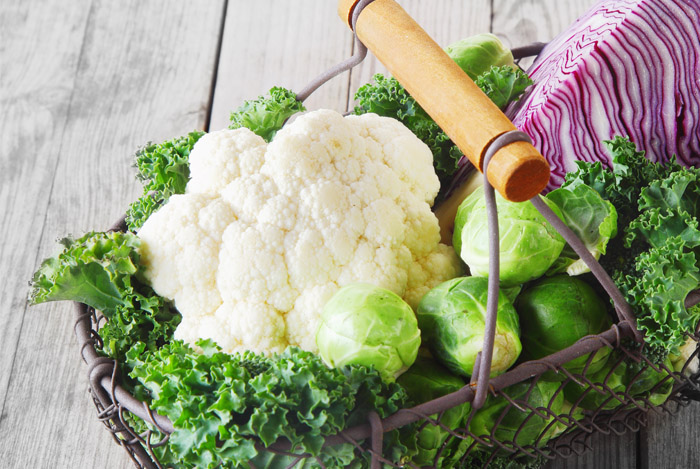 This group of veggies was originally named after the Latin word for ‘cross-like’ or crucifix shaped because their flowers grew as four equal-sized petals resembling a cross.
This group of veggies was originally named after the Latin word for ‘cross-like’ or crucifix shaped because their flowers grew as four equal-sized petals resembling a cross.
However, many scientists are starting to refer to cruciferous veggies as brassica veggies instead. Brassica translates as cabbage in Latin, and cabbage is one of the family’s super healthy members.
Here’s a list of all the veggies in the cruciferous family we’re talking about:
- Arugula
- Bok choy
- Broccoli
- Brussels sprouts
- Cabbage
- Cauliflower
- Chinese cabbage
- Collard greens
- Daikon radish
- Horseradish
- Kale
- Kohlrabi
- Land cress
- Mustard greens
- Radish
- Rutabaga
- Shepherd’s purse
- Turnip
- Watercress
So now that you know which veggies are cruciferous, let’s get into why these guys are so awesome for you.
Cruciferous Veggies Fight Free Radicals
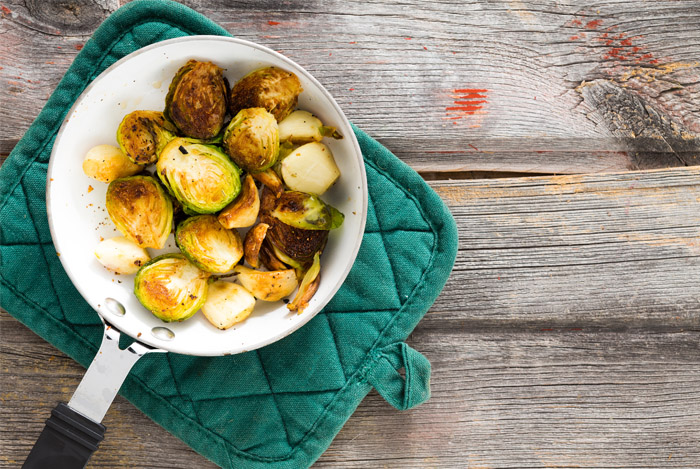 You’ll find free radicals everywhere; they’re caused by environmental pollutants, pesticides, and even certain foods. Once inside our bodies, they start damaging proteins, DNA, and cell membranes.
You’ll find free radicals everywhere; they’re caused by environmental pollutants, pesticides, and even certain foods. Once inside our bodies, they start damaging proteins, DNA, and cell membranes.
This damage is known as oxidative stress. When our bodies get overloaded with these harmful molecules, they can cause serious mutations like the abnormal replication of cells, aka cancer.
Reducing these free radicals may also decrease the chances of developing lung, colon, prostate, breast, and other cancers.
During one study, 20 participants were instructed to eat 1–2 cups of cruciferous veggies every day for three weeks. Researchers then measured the amount of oxidative stress in their bodies.
The participants stopped eating the cruciferous veggies for another three weeks to induce a wash-out period. They were instructed to take a multivitamin with fiber. Again their oxidative stress measurements were taken.
Researchers discovered that participants reduced their oxidative stress levels by 22% when they were eating cruciferous veggies every day.
What happened during the multivitamin with fiber period? A negligible 0.2% drop.
So it’s safe to assume that when cruciferous veggies are busy fighting free radicals and oxidative stress, your risks of developing cancer decreases.
Matthew Wallig, DVM, PhD, says that lab studies show that sulforaphane can “stimulate enzymes in the body that detoxify carcinogens before they damage cells.”
These Veggies Literally Prevent Cancer
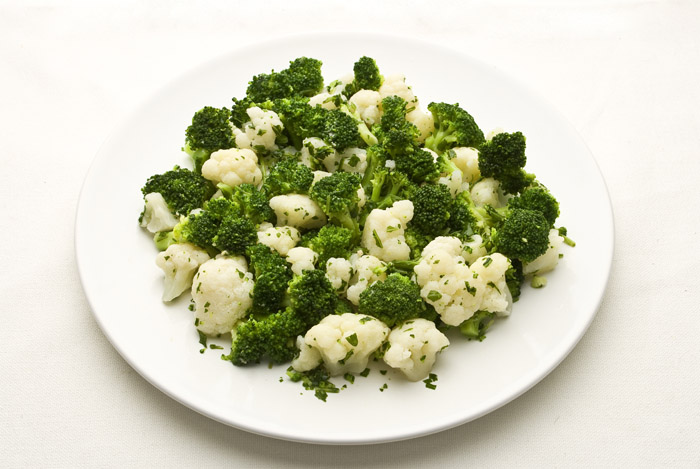 According to one review, more than 70% of studies found links between cruciferous vegetables and protection against cancer.
According to one review, more than 70% of studies found links between cruciferous vegetables and protection against cancer.
And it’s not hard to understand why.
Cruciferous veggies contain glucosinolate phytonutrients, which are part of the isothiocyanates (ITCs) family. The two ITCs most widely studied are indole-3-carbinol (IC3) and sulforaphane.
The National Institute of Cancer says these compounds may:
- Help protect cells from DNA damage
- Inactivate carcinogens
- Have antiviral and antibacterial benefits
- Have anti-inflammatory properties
- Induce cell death (apoptosis)
- Inhibit tumor blood vessel formation and tumor cell migration (needed for metastasis)
With all these incredible benefits, it’s not hard to see why your mom was right about eating your cauliflower and broccoli.
Speaking of broccoli, one study sought to determine if eating broccoli had any effect on the prevalence of colorectal cancer.
When men and women between the ages of 50–74 consumed an average of 3.7 cooked half-cup servings of broccoli a week, they were 50% less likely to develop colorectal cancer than those who never ate broccoli.
And the good news doesn’t stop there.
During studies, when women regularly ate one serving per day of cruciferous vegetables, they had a 50% reduced risk of breast cancer.
Don’t feel like eating cruciferous veg every day?
Another study determined that eating cruciferous veggies just once a week was associated with a 17% decrease in breast cancer risk.
And, as noted by the Fred Hutchinson Cancer Research Center, when men consumed three or more half-cup servings of cruciferous veggies a week they were 41% less likely to develop prostate cancer.
Combining cauliflower with curcumin (the active compound found in the ultra healthy spice turmeric) may help prevent and treat prostate cancer.
According to researchers at John Hopkins University in Baltimore, besides being able to prevent cancer, cruciferous veggies may be able to control the severity of growing tumors.
Researchers fed broccoli sprouts to some of the rats in the study for five days. Broccoli sprouts “grown in plastic laboratory dishes from ordinary broccoli seeds, contain anywhere from 30 to 50 times the concentration of protective chemicals found in mature broccoli plants.”
To test these chemopreventive veggies, they injected all of the rats with a carcinogen a few days later. As we know, carcinogens are capable of causing cancer in living tissue.
The results proved that when the rats consumed the broccoli sprouts, they developed smaller, fewer, and slower-growing tumors than the rats who did not eat the broccoli sprouts.
So what about patients who have already been diagnosed with cancer?
Can Cruciferous Veggies Treat Cancer?
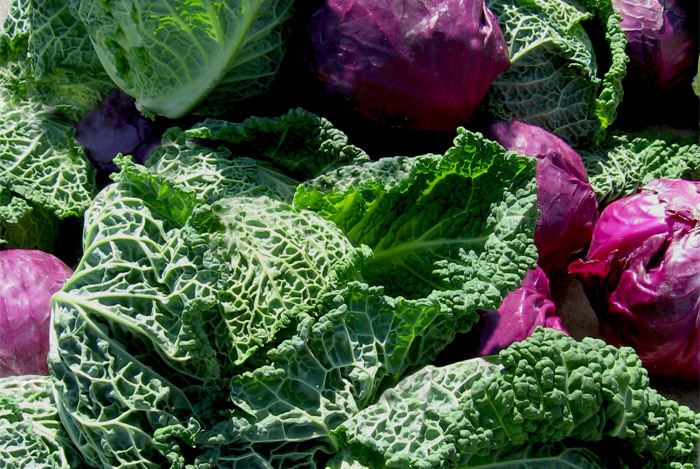 Can vegetables really have an effect on stopping the spread of cancer? This scenario seems entirely too good to be true.
Can vegetables really have an effect on stopping the spread of cancer? This scenario seems entirely too good to be true.
So is it?
One study tested the role of IC3 on cervical cancer. Researchers divided women into three groups; one group received a placebo and the others received either a 200 mg dose of IC3 or a 400 mg dose to take once every day for 12 weeks.
The results turned out to be pretty amazing.
Four of the eight women taking the 200 mg IC3 and four of the nine women taking the 400 mg IC3 “had complete regression.”
As you might expect, none of the women taking the placebo had complete regression.
Research also proves that sulforaphane “induces growth arrest and apoptosis” in epithelial ovarian cancer cells.
Integrative Oncology says that sulforaphane:
- Helps prevent the development of cancer by shutting-off crucial genes that are important in promoting the transformation of abnormal cells into cancer cells
- Reduces the number of cancer stem cells, considered the most difficult cell type in most cancers to eradicate
- Blocks the formation of tumor blood vessels and suppresses cancer cell metastases
- Promotes the excretion of carcinogens from the body and reduces their formation in the body
Jay H. Fowke, PhD, says: “There’s no harm [eating cruciferous veggies every day] and consistently, across the line, it’s associated with improved health and a reduced risk of various chronic diseases.”
What other chronic diseases benefit from the help of cruciferous veggies?
Go Heart-Healthy
 Thanks to their sulforaphane content, cruciferous veggies make a perfect addition to your anti-inflammatory diet.
Thanks to their sulforaphane content, cruciferous veggies make a perfect addition to your anti-inflammatory diet.
Eating a wide variety of heart-healthy cruciferous vegetables reduces cardiovascular disease by suppressing the inflammatory activation of arteries and preventing artery clogging and hardening.
Plus, since cruciferous veggies are rich in B-complex vitamins, they also help curb the excessive formation of homocysteine.
“Blood levels of homocysteine tend to be highest in people who eat a lot of animal protein and consume few fruits and leafy vegetables, which provide the folic acid and other B vitamins that help the body rid itself of homocysteine.”
High levels of homocysteine have been associated with heart attacks, strokes, blood clots, and even Alzheimer’s disease.
Good news: vitamins B6, B12, and B9 (folate/folic acid) are all present in cruciferous veggies.
Here’s what else these veggies can do for the health of your heart.
Lower Cholesterol
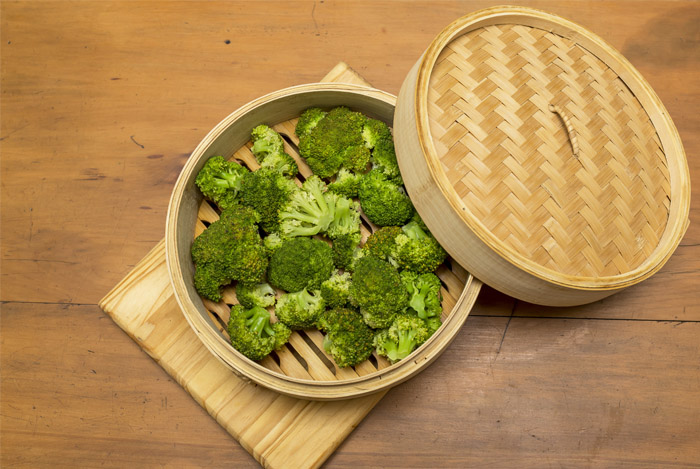 Cruciferous veggies are super fibrous, which helps lower cholesterol levels.
Cruciferous veggies are super fibrous, which helps lower cholesterol levels.
When fiber binds to cholesterol compounds and bile acids in our digestive system, it stops them from being absorbed. The cholesterol is then eliminated from our body instead.
“Our liver needs to replace the lost bile acids by drawing upon our existing supply of cholesterol, and as a result, our cholesterol levels drop down.”
Raw veggies work well, but lightly steamed cruciferous veggies work even better.
A study published in Nutrition Research discovered that “steam cooking significantly improved the…bile acid binding of…kale… compared with previously observed bile acid binding values for these vegetables raw.”
Improved bile acid binding means more cholesterol is eliminated from our bodies – major win!
Rich in Omega-3s
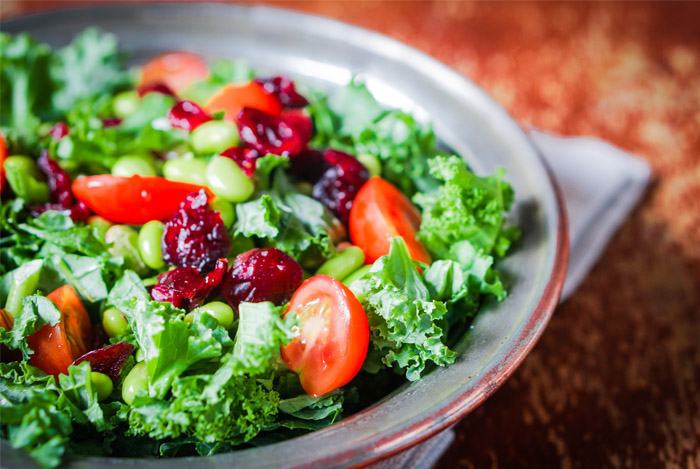 Cruciferous veggies are an amazing plant source that have more omega-3 fatty acids than omega-6s.
Cruciferous veggies are an amazing plant source that have more omega-3 fatty acids than omega-6s.
Chris Kresser points out that, “a diet of a lot of omega-3 and not much omega-6 will reduce inflammation.” While on the other hand, a diet plentiful in omega-6 will encourage inflammation.
“Kale is actually a great source of alpha-linoleic acid (ALA), the omega-3 fatty acid that’s essential for brain health, reduces type 2 diabetes risk and boosts heart health as well.”
Omega-3s are not only great for your heart, but they’ve been studied for their positive effects on “cancer, depression, and attention-deficit hyperactivity disorder (ADHD)” as well.
Your Brain on Cruciferous Veggies
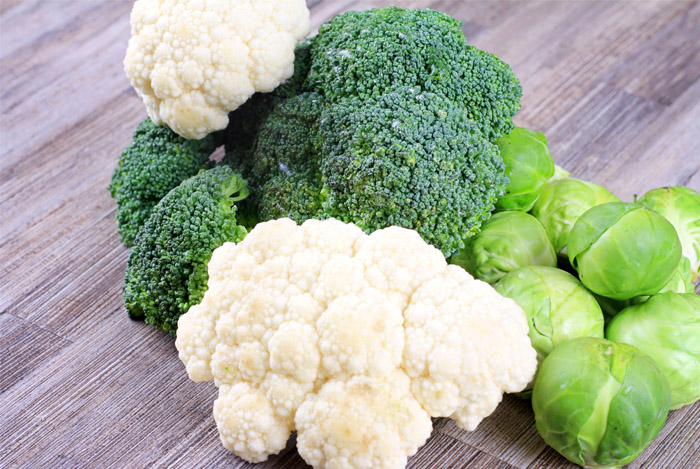 Choline isn’t technically a vitamin, but it’s definitely an essential nutrient.
Choline isn’t technically a vitamin, but it’s definitely an essential nutrient.
Dr. Weil says that choline is utilized by the body for:
- Aiding nerve signaling
- Maintaining cell membranes
- Transporting triglycerides from the liver
- Aiding early brain development
Scientists from one study tested choline on pregnant rats. The results showed that the babies of mice fed choline had “better memories, learned faster, and had larger brain cells compared to those fed a normal diet.”
Another mouse study revealed that prenatal choline supplementation protected their brains from Alzheimer’s later in life.
Scientists are now studying choline to prevent cognitive decline, dementia, and to regrow brain cells as we age.
Choline has been linked to stimulating neurogenesis, which means the growth of new brain cells and neural connections.
You’ll typically find choline in animal sources such as super healthy eggs, meat, shrimp, and pork.
But guess what?
Your best veggie sources just so happen to be collard greens, Brussels sprouts, broccoli, and cauliflower – a lovely bunch of cruciferous veggies.
Protect Your Eyes
 Vitamin A strengthens our eyes, especially our night vision, and protects us from age related macular degeneration (AMD).
Vitamin A strengthens our eyes, especially our night vision, and protects us from age related macular degeneration (AMD).
The American Optometric Association states that “age-related macular degeneration is the leading cause of blindness in people over age 55 in the Western world and the incidence is expected to triple by 2025.”
Good thing cruciferous veggies are so rich in vitamin A!
But here’s even better news: cruciferous veggies are also chock full of lutein and zeaxanthin.
When our bodies get enough lutein and zeaxanthin, they act like antioxidants and reduce our risks of developing AMD. They even protect our eyes from cataract growth.
Researchers discovered that the sulforaphane in cruciferous veggies also protects our eyes from the sun’s ultraviolet light. This is a big contributing factor in macular degeneration.
Immunity Booster
 Cruciferous veggies are abundant in vitamin C.
Cruciferous veggies are abundant in vitamin C.
We all know that vitamin C deficiency makes our immune systems weak and susceptible to illnesses. But I bet you didn’t know that cruciferous veggies may actually be more beneficial during cold season than a glass of orange juice.
One serving of broccoli has 132 mg of vitamin C per serving, which is more than what you’ll find in a medium orange (69.7 mg). Plus, you won’t have any of the sugar found in oranges or orange juice.
But vitamin C is more than an immunity booster. Vitamin C is necessary for:
- Cell repair
- Protecting our skin from sun damage
- Decreasing blood sugar
- Maintaining eye strength
- Keeping our cardiovascular system healthy
Weight Loss Helper
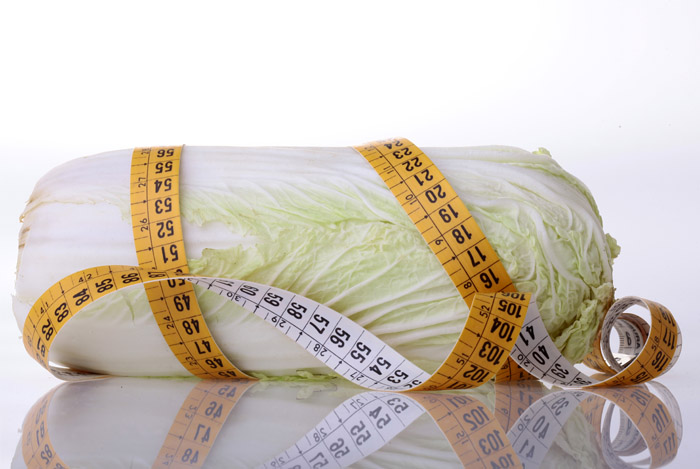 It’s no surprise that people who eat more fibrous veggies tend to weigh less.
It’s no surprise that people who eat more fibrous veggies tend to weigh less.
Just 3/4 a cup of steamed broccoli contains 7 g of fiber for just 30 calories. That’s a great way to work towards your 25–38 g of daily fiber without filling up on too many calories.
The fiber in cruciferous veggies will help keep you full so you don’t overeat or feel hungry, which is a dream come true when you’re trying to lose weight and eat fewer calories.
Eating several servings of fiber and water-rich cruciferous veggies throughout the day with your meals will help stretch your fullness all day so you can actually be happy on fewer calories instead of hangry.
Here’s promising news: those super hardworking indole-3-carbinol compounds so abundant in cruciferous veggies may prevent obesity.
According to one study, when rats were fed a high-fat diet, IC3 decreased inflammation and reduced the formation of fat cells so the mice did not become obese. The IC3 even increased the number of calories the mice burned!
While this is still very preliminary evidence, I can’t wait to hear more about veggies that work better than most weight loss pills I’ve reviewed.
Don’t Cruciferous Veggies Give You Gas?
 Sometimes your kitchen smells a bit pungent when you’re roasting Brussels sprouts or broccoli or even making kale chips, and this may be off putting for some people.
Sometimes your kitchen smells a bit pungent when you’re roasting Brussels sprouts or broccoli or even making kale chips, and this may be off putting for some people.
But sometimes it’s the bubbly, gassy problems after you eat cruciferous veggies that make you want to stay away.
A high-fiber diet, such as a diet rich in cruciferous vegetables, may cause excessive flatulence and belching. Not sexy.
“Fiber isn’t digested and absorbed in the gastrointestinal tract,” says Toby Smithson, RDN, LDN, CDE, and spokesman for the Academy of Nutrition and Dietetics. “People will experience more gas buildup because of the fermentation of fiber or other non-digested carbohydrates in the large intestine.”
This is a natural process so don’t let this deter you from eating more fiber and veggies.
Instead, just follow these pro tips to banish the bloat for good:
- Ease into a high-fiber diet if your body isn’t used to eating one, gradually adding more fiber to your diet over a few months.
- Eat small portions at first to get your body used to digesting high-fiber.
- Always increase your water intake as you eat more fiber; it will relieve gas, bloating, and constipation!
There’s really no reason why you shouldn’t be adding more cruciferous veggies to your menu planning.
I personally love throwing kale into my smoothies, steaming a batch of broccoli to accompany my work week lunches, and varying plain salads with a bit of peppery arugula or watercress.
With all of these incredible and undeniable health benefits, I wholeheartedly believe you should be eating a serving of cruciferous veggies a day. Good thing there are so many of them to choose from!
What’s your favorite cruciferous veggie?
I think I’m partial to those little Brussels sprouts that make me feel like a giant eating a head of cabbage, but I bet I know a lot of kale fans out there! I’d love to hear your take on this superfood family in the comments!
The post How Broccoli and 3 Other “Stinky” Foods Prevent Cancer appeared first on Nutrition Secrets.
http://www.nutritionsecrets.com/what-are-cruciferous-vegetables-why-you-should-be-eating-them/
No comments:
Post a Comment